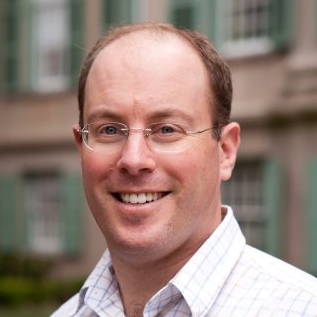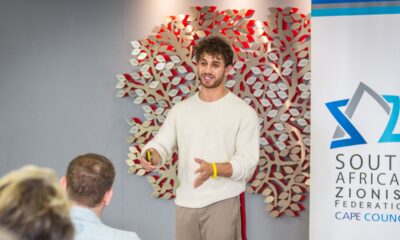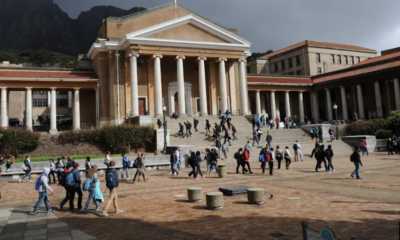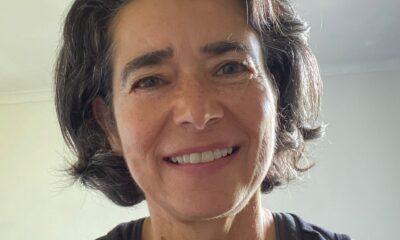
News

UCT ‘gave up hospital’ to pursue anti-Israel agenda
The University of Cape Town’s (UCT’s) executive council (exco) didn’t tell council members that the university stood to lose up to R750 million in donations, including the donation of a hospital, if they adopted two anti-Israel resolutions, according to a supplementary affidavit filed in the Western Cape division of the High Court of South Africa in mid-January.
Professor Adam Mendelsohn’s supplementary affidavit, comes after he filed a lawsuit in August 2024 asking the court that the council’s two anti-Israel resolutions, passed on 22 June 2024, be declared unlawful, unconstitutional, and invalid, and are reviewed and set aside. UCT will oppose the application.
“Since I delivered my founding affidavit, I learned [from meeting records] that members of the council’s executive committee deliberately failed to disclose relevant information at the council meeting of 22 June 2024,” stated Mendelsohn. “They failed to disclose this deliberately, in bad faith, and in breach of their fiduciary duties.”
Therefore, “Council had no idea of the profound ramification[s] when it passed its resolutions,” stated Mendelsohn. “It failed to consider how this could cost UCT half a billion rand and a new hospital which would serve as a training facility for doctors. Had it conducted even a cursory inquiry, it would have learned that its decision would jeopardise one of the most significant donations to UCT in recent years, aimed at serving the broader Western Cape. The council’s failure speaks to a lapse in governance of severe proportions.”
The resolutions call for the rejection of the International Holocaust Remembrance Alliance (IHRA) definition of antisemitism, and that no UCT academic may enter into or continue relations with “any research group or network whose author affiliations are with the Israel Defense Forces or the broader Israeli military establishment”.
The supplementary affidavit filed by Mendelsohn, who is the director of the Kaplan Centre for Jewish Studies at UCT, also details how on 11 November 2024, he was suspended from his role as head of UCT’s history department, “pending an investigation”.
UCT is “censoring freedom of expression and academic freedom, so much so that it retaliated against the mere bringing of an application that asserts the constitutional right to freedom of expression”, stated Mendelsohn. His affidavits say the resolutions curtail research and have profoundly negative implications for academia and the survival of UCT.
Dr Susan Tager, trustee of the Donald Gordon Foundation (DGF) and chief executive of the Wits (The University of the Witwatersrand) Donald Gordon Medical Centre, provides a supporting affidavit. It details how the DGF was in recent discussions to buy the UCT academic hospital – not owned by the university – for UCT, or to provide the funds for UCT to establish a hospital replicating the Donald Gordon Medical Centre. The DGF was seeking to donate R400 million to R500 million to UCT to this end.
However, Tager’s affidavit describes how discussions broke down as a direct result of the council’s resolutions, breaching a contract with the DGF by rejecting the IHRA definition. The resolution to reject the IHRA definition was proposed by Professor Leslie London, the chairperson of public health medicine at UCT, whose work will now be impacted by the loss of the hospital.
The affidavit describes how on 23 May 2024, the council’s exco met, including council Chairperson Norman Arendse; then-Vice-Chancellor Professor Daya Reddy; and six others. At this meeting, the vice-chancellor informed the exco that the DGF considered UCT in breach of a contract of donation, and that another donor, the Dell Foundation, was suspending funding to UCT because of the resolution to boycott Israeli academics.
But during the council meeting in June, “exco members sat silent”, allowing the council to vote on a resolution without saying that doing so may cost the university millions, stated Mendelsohn.
The council also failed to consider the impact on staff and students. A letter dated 20 November 2024 from UCT’s Neuroscience Institute (NI) laments that the council’s resolutions “have directly jeopardised donor confidence in the NI”, and that its “very future” is now threatened by the council’s decisions. “The termination of funding from charitable foundations will [also] have a direct impact on students,” Mendelsohn said.
He said the suggestion that donors “bully” or “strong-arm” UCT misses the point. “The point is that the council should know the financial implications of its decisions. In this case, it simply didn’t.”
In addition, “UCT’s compliance with zero tolerance for antisemitism, as defined by the IHRA, was a term of the DGF donation contract signed by the chairperson and then-vice-chancellor, and therefore pre-dated the council resolutions,” said Mendelsohn. “There can be no suggestion of UCT being ‘strong-armed’ when it breached terms of an existing contract to which it had agreed.”
Meanwhile, the UCT council had conceded in correspondence that it had failed to consider relevant documents at its meeting of 22 June 2024, which Mendelsohn said “suffices to set aside” the resolutions.
Trevor Norwitz, who resigned as chairperson of the UCT Fund in 2023 in protest against the university’s anti-Israel stance, said, “To read the details behind the council’s anti-Israel decision is more shocking than the appalling decision itself. It lays bare that this wasn’t just a betrayal of UCT’s ideals and its Jewish constituents, but a gross breach of fiduciary duty, knowingly undertaken.”
Sara Gon, the director of the Free Speech Union of South Africa, said, “to suspend Professor Mendelsohn for exercising his constitutional rights and duties is a derogation of his rights to freedom of speech, academic freedom, and the exercise of his professional obligations.
“To show their ‘principled’ stand against Professor Mendelsohn as head of the history department, his staff members simply refused to attend departmental meetings with him,” said Gon. “UCT should have supported Professor Mendelsohn and warned staff they would be disciplined for insubordination.” Instead, UCT allowed a professor who complained about Mendelsohn’s lawsuit to become its new head of department.
David Benatar, emeritus professor of philosophy at UCT and the author of The Fall Of The University Of Cape Town – Africa’s Leading University In Decline, said Mendelsohn’s supplementary affidavit “reveals ongoing mismanagement at UCT. The university should be ashamed, not that one of its professors is seeking to defend his constitutional rights, but that it has both made that defence necessary, and then retaliated against him. UCT’s pursuit of its boycott against Israel is doing much more harm to UCT than it will ever do to Israel.”
“This case has very little to do with Israel and the legality of its conduct in Gaza,” said Mendelsohn. “It concerns the council’s statutory duty to govern UCT; whether it acted in the best interests of the university; whether the council’s process leading to the resolutions accords with legality, good governance, and fiduciary duties; and whether the council can limit academic freedom. These are issues of principle and process.”
UCT spokesperson Elijah Moholola told the SA Jewish Report that UCT couldn’t comment on Mendelsohn’s suspension as human resources-related matters at UCT are confidential.
As for the council exco deliberately failing to disclose information regarding donations, he said, “UCT has noted the allegation. It is the subject of high court proceedings, and UCT will address it through the appropriate legal processes as part of those proceedings.”










